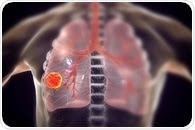|
| | June 26, 2019 | |
| | |
| | The latest respiratory diseases news from News Medical | |
|
|
 |
| |  Making Bacterial Infections a Thing of the Past for Chronic Respiratory Conditions Making Bacterial Infections a Thing of the Past for Chronic Respiratory Conditions
It is possible for CF, COPD and bronchiectasis patients to have a long-term respiratory infection, causing intermittent episodes of exacerbation where their symptoms increase. There are treatments which can be provided long term, but most of these are in cystic fibrosis and are based on inhaled antibiotic therapy. Antimicrobial resistance (AMR) develops in people with cystic fibrosis who receive antibiotics - what is left to determine, is whether resistance predicts response to treatment.
| |
|
|
|
|
 |
| |  In a study led by UCLA investigators, treatment with the immunotherapy drug pembrolizumab helped more than 15% of people with advanced non-small cell lung cancer live for at least five years - and 25% of patients whose tumor cells had a specific protein lived at least that long. In a study led by UCLA investigators, treatment with the immunotherapy drug pembrolizumab helped more than 15% of people with advanced non-small cell lung cancer live for at least five years - and 25% of patients whose tumor cells had a specific protein lived at least that long. | |
|
| |  As advances in the treatment of non-small cell lung cancer (NSCLC) extend patients' lives, more of these patients are facing a different threat: adverse cardiovascular events, such as heart attacks and heart failure. As advances in the treatment of non-small cell lung cancer (NSCLC) extend patients' lives, more of these patients are facing a different threat: adverse cardiovascular events, such as heart attacks and heart failure. | |
|
| |  Three beagles successfully showed they are capable of identifying lung cancer by scent, a first step in identifying specific biomarkers for the disease. Researchers say the dogs' abilities may lead to development of effective, safe and inexpensive means for mass cancer screening. Three beagles successfully showed they are capable of identifying lung cancer by scent, a first step in identifying specific biomarkers for the disease. Researchers say the dogs' abilities may lead to development of effective, safe and inexpensive means for mass cancer screening. | |
|
| |  In sudden death in epilepsy, people stop breathing for no apparent reason and die. Now, a group of UConn neuroscientists have a lead as to why, they report in the journal eLife. More than one of every 1,000 people with epilepsy die each year from what's called sudden unexpected death in epilepsy (SUDEP). No one knows why. In sudden death in epilepsy, people stop breathing for no apparent reason and die. Now, a group of UConn neuroscientists have a lead as to why, they report in the journal eLife. More than one of every 1,000 people with epilepsy die each year from what's called sudden unexpected death in epilepsy (SUDEP). No one knows why. | |
|
|
|
|








































No hay comentarios:
Publicar un comentario